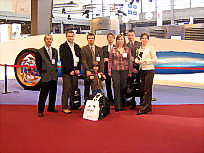Applications are invited for a PhD studentship in “Safety of Indoor Use of Fuel Cell and Hydrogen Systems”. Candidates should hold a first or upper second class honours degree in an engineering discipline or a cognate area. Successful candidates will enrol as of January 2012, on a full-time programme of research studies leading to the award of the degree of Doctor of Philosophy.
The studentship will comprise fees (Home and EU rate) and an annual stipend of £13,590. It will be awarded for a period of up to three years subject to satisfactory progress and is tenable in the Faculty of Art, Design and the Built Environment at the Jordanstown Campus.
The closing date for receipt of completed applications is 9th December 2011
Interviews will be held late December
Funding source: FP7 FCH JU project HyIndoor “Pre-normative research on safe in-door use of fuel cells and hydrogen systems”
Supervisor 1: Professor Vladimir Molkov
Supervisor 2: Dr Sile Brennan
Description:
The candidate will join the HySAFER team participating in the European project HyIndoor “Pre-normative research on safe in-door use of fuel cells and hydrogen systems”, funded by the Fuel Cell and Hydrogen Joint Undertaking (FCH JU). The aim of this PhD study is to use contemporary analytical and numerical methods, including computational fluid dynamics (CFD), to close knowledge gaps in safety of the indoor use of fuel cell and hydrogen (FCH) systems. The objectives of the study include analysis of unignited releases and dispersion of hydrogen indoor in conditions of ventilation, under-ventilated fires, and mitigation of accident consequences. The severity of the consequences of different realistic accident scenarios will be modelled to assist in the development of safety strategies and engineering solutions for inherently safer indoor use of FCH systems. The candidate will have support from HySAFER researchers and access to unique experimental data, available from the collaborators on the project, to validate models and simulations. He/she will be involved in the development of engineering tools that will be applied for safety design for the indoor use of FCH installations.






